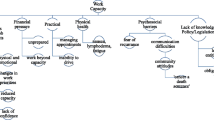Abstract
Purpose
Despite the personal and economic importance of the issue of returning to work after cancer treatment, there are major limitations in the research literature on the topic. Indeed, in relation to the focus of the present article, the experience of return to work for Australian haematology patients, there is little research available.
Methods
The return-to-work findings are a sub-set from a study examining survivorship issues conducted through in-depth, qualitative interviews with a state-wide sample (n = 50) of individuals who were at least 1 year post-treatment for haematological malignancy.
Results
There were three groups identified in relation to employment: (1) those who were retired and work was not an issue, (2) those who had successfully re-entered the workforce and (3) those who wanted to work but were finding the process of return-to-work difficult. It is the third group that is the major focus for this paper.
Conclusions
The clear indications are that group 3 requires assistance with return-to-work and were vulnerable to a range of psychosocial distress caused by inability to return to employment. Supportive care strategies to assist return to employment are provided.
Relevance of manuscript to inform research, policies and/or programs
Current improvements in cancer treatments have not only increased the number of cancer survivors but also peoples’ ability to work during and following treatment. Maximising opportunities for cancer patients to return to work is a significant concern not only for individuals and employers but also economically for society. The findings reported in this article explored the individual story of a range of individuals with haematological malignancies in relation to their desire and efforts to return to work. Importantly, the findings not only provide insights on the work re-entry challenges faced by such individuals but also posit supportive care service delivery solutions to assist those who are vulnerable and frustrated in their efforts to find employment.
Similar content being viewed by others
References
Amir Z, Wynn P, Chan F, Strauser D, Whitaker S, Luker K (2010) Return to work after cancer in the UK: attitudes and experiences of line managers. J Occup Rehabil 20(4):435–442
Mahar KK, Brintzenhofe K, Shields JJ (2008) The impact of changes in employment status on psychosocial well-being: a study of breast cancer survivors. J Psychosoc Oncol 26(3):1–17
Pryce J, Munir F, Haslam C (2007) Cancer survivorship and work: symptoms, supervisor response, co-worker disclosure and work adjustment. J Occup Rehabil 17(1):83–92
Taskila T, Lindbohm ML (2007) Factors affecting cancer survivors’ employment and work ability. Acta Oncol 46(4):446–451
Rasmussen DM, Elverdam B (2008) The meaning of work and working life after cancer: an interview study. Psychooncology 17(12):1232–1238
Short PF, Vasey JJ, Belue R (2008) Work disability associated with cancer survivorship and other chronic conditions. Psychooncology 17(1):91–97
Quinlan E, Thomas-MacLean R, Hack T, Kwan W, Miedema B, Tatemichi S, Towers A, Tilley A (2009) The impact of breast cancer among Canadian women: disability and productivity. Work 34(3):285–296
Park JH, Park JH, Kim SG (2009) Effect of cancer diagnosis on patient employment status: a nationwide longitudinal study in Korea. Psychooncology 18(7):691–699
Fitschi L, Driscoll T (2006) Cancer due to occupation in Australia. Aust N Z J Public Health 30(3):213–219
Gordon L, Lynch BM, Newman B (2008) Transitions in work participation after a diagnosis of colorectal cancer. Aust N Z J Public Health 32(6):569–574
Cheung MC, Imrie KR, Friedlich J, Buckstein R, Lathia N, Mittmann N (2009) The impact of follicular (FL) and other indolent non-Hodgkin’s lymphomas (NHL) on work productivity—a preliminary analysis. Psychooncology 18(5):554–559
Sanchez KM, Richardson JL, Mason HRC (2004) The return to work experiences of colorectal cancer survivors. AAOHN J 52(12):500–510
Yarker J, Munir F, Bains M, Kalawsky K, Haslam C (2010) The role of communication and support in return to work following cancer-related absence. Psychooncology 19(10):1078–1085
Tamminga SJ, de Boer AG, Verbeek JH, Frings-Dresen MH (2010) Return-to-work interventions integrated into cancer care: a systematic review. Occup Environ Med 67(9):639–648
McGrath P, Hartigan B, Holewa H, Skaparis M (2011) ‘Chemo Brain’: research findings indicate need for caution. AJC 10(3):33–41
Short PF, Vargo MM (2006) Responding to employment concerns of cancer survivors. J Clin Oncol 24(32):5138–5141
Australian Institute of Health and Welfare (AIHW) (2010). Cancer in Australia 2010: an overview. Cancer series no. 60. Cat. no. CAN 56. Canberra: AIHW
Amir Z, Neary D, Luker K (2008) Cancer survivors’ views of work 3 years post diagnosis: a UK perspective. Eur J Oncol Nurs 12(3):190–197
Palmadottir G (2010) The role of occupational participation and environment among Icelandic women with breast cancer: a qualitative study. Scand J Occup Ther 17(4):299–307
Park JH, Park JH, Kim SG, Lee KS, Hahm MI (2010) Changes in employment status and experience of discrimination among cancer patients: findings from a nationwide survey in Korea. Psychooncology 19(12):1303–1312
Acknowledgements
The authors would like to thank CQ University where the data was collected and Griffith University where the analysis and write up was completed.
Conflict of interest
The authors have no conflict of interest with regards to funding or authorship.
Author information
Authors and Affiliations
Corresponding author
Rights and permissions
About this article
Cite this article
McGrath, P.D., Hartigan, B., Holewa, H. et al. Returning to work after treatment for haematological cancer: findings from Australia. Support Care Cancer 20, 1957–1964 (2012). https://doi.org/10.1007/s00520-011-1298-2
Received:
Accepted:
Published:
Issue Date:
DOI: https://doi.org/10.1007/s00520-011-1298-2




